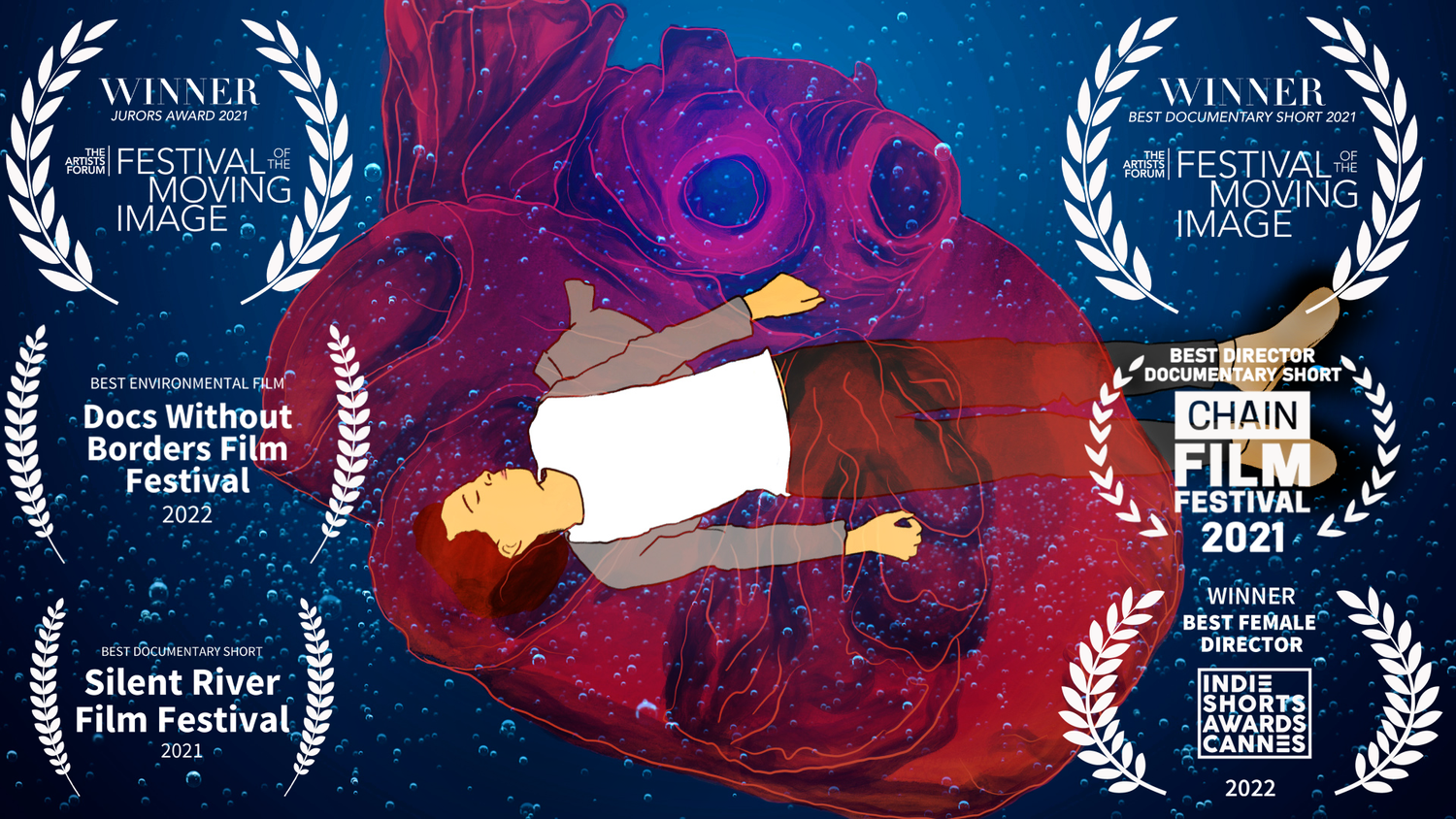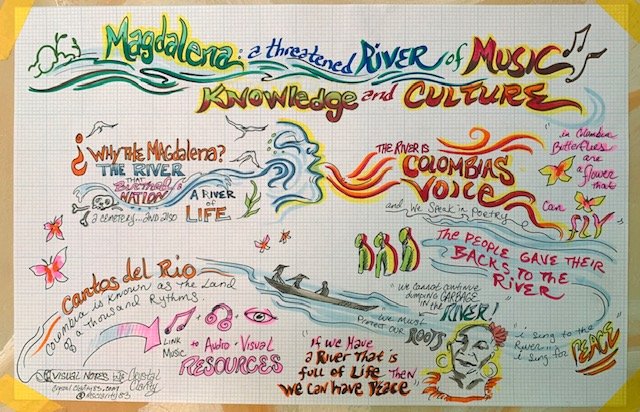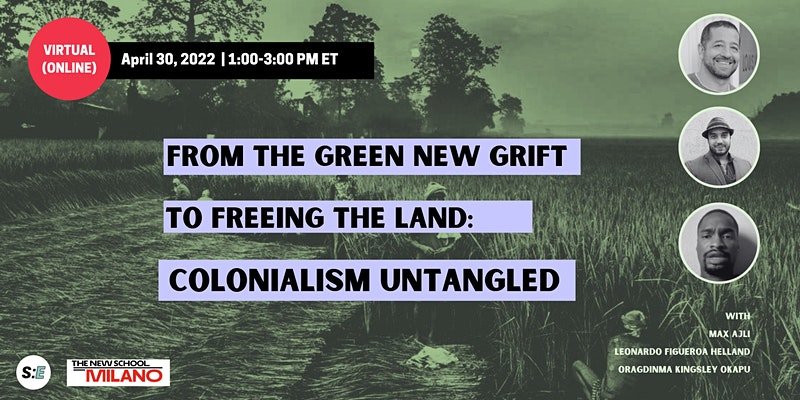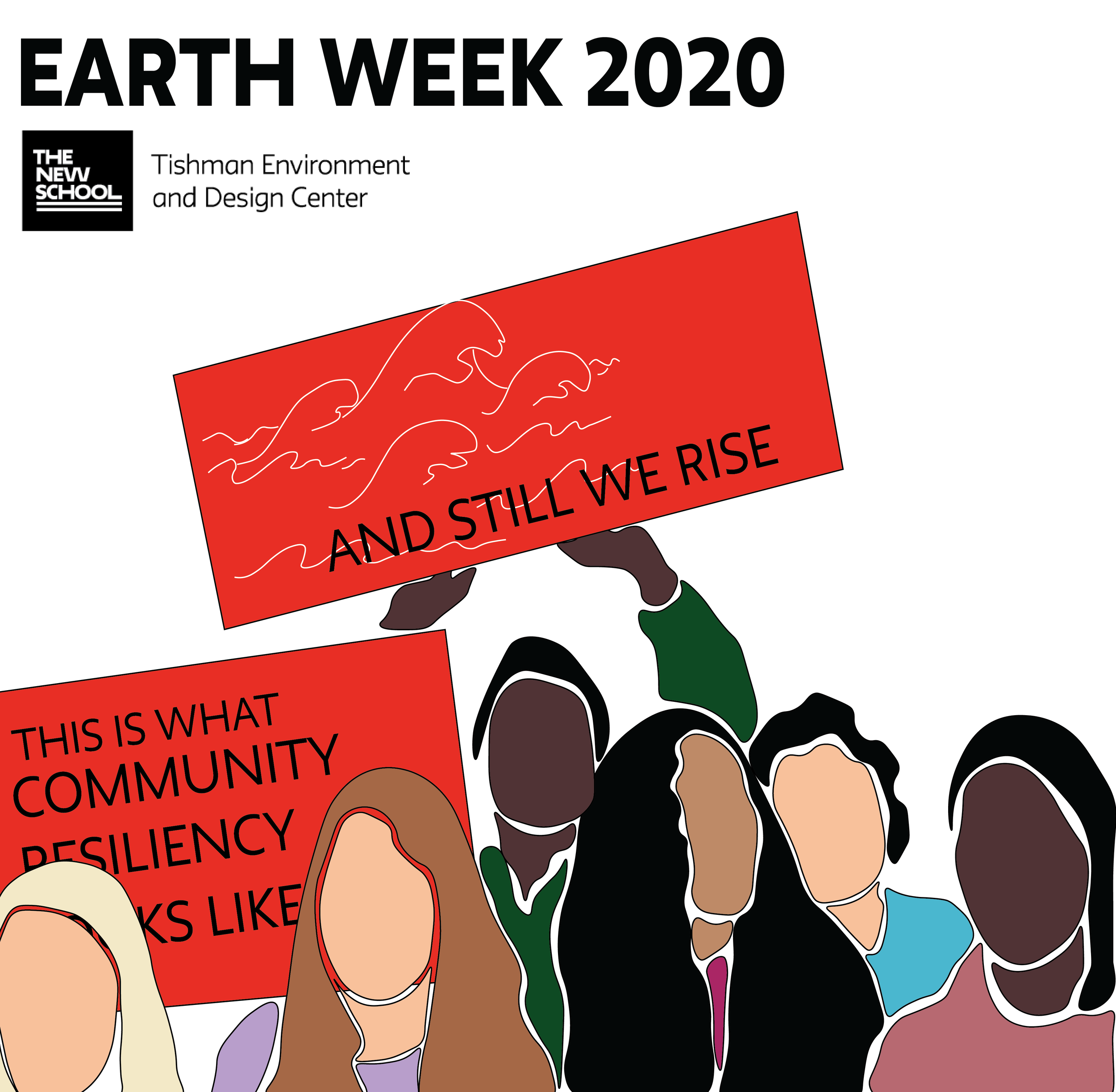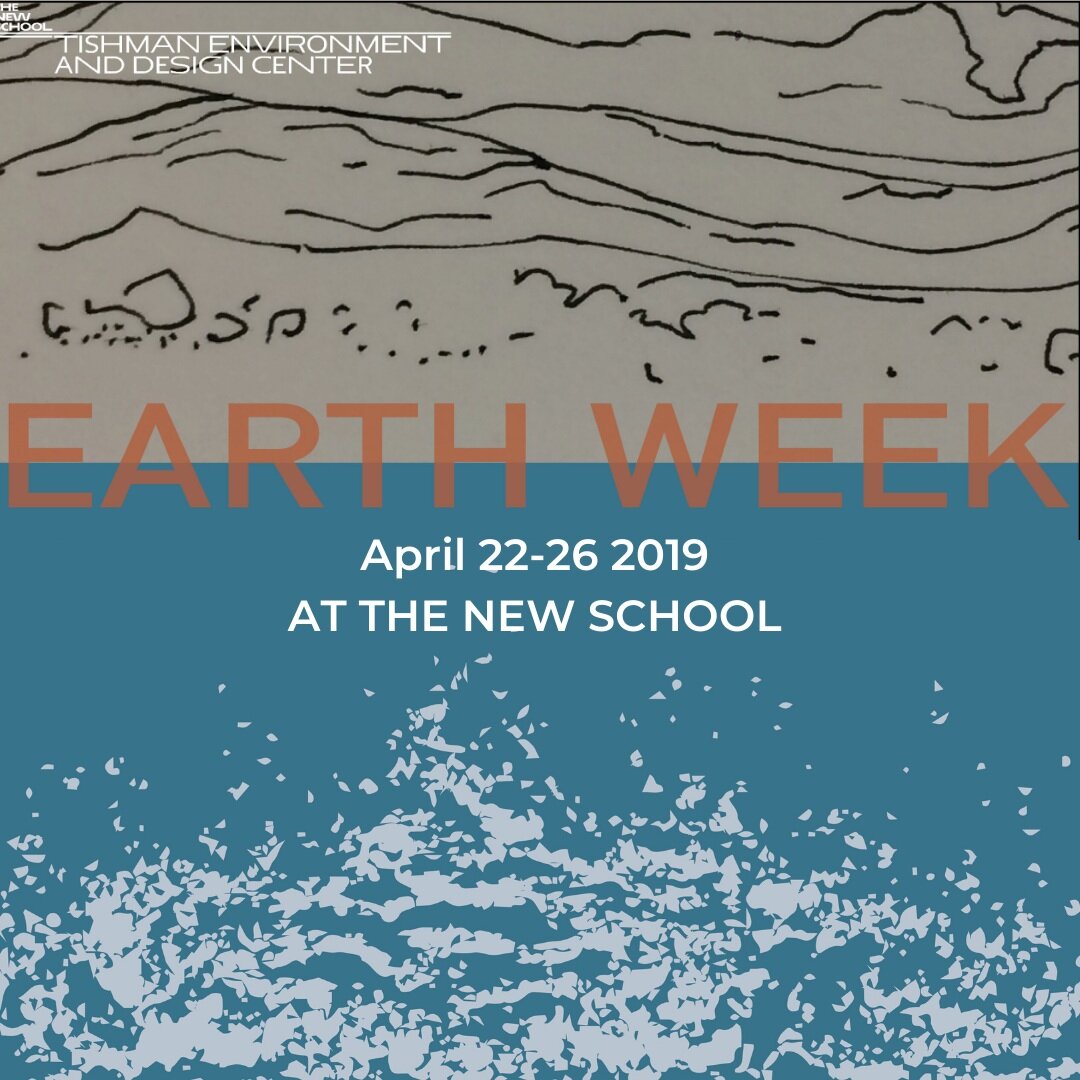Earth WEEk
April 2022
During the Month of April, the Tishman Center will be hosting, co-sponsoring and promoting Earth Week events. Our theme this year is: Art, Design, Democracy: Tools to Achieve Climate Justice. We will have a number of events featuring musicians, chefs, artists, planners and academics who will share their experiences, art, music and more to help us think of creative and engaging ways to get closer to a more just and safe world.
You can RSVP below for all upcoming events and you can reach us at @newschoolTEDC on Twitter, @tishmancenter on Instagram and tedc@newschool.edu by email.
Risa Puleo - Thinking with Sheep, Swallows, and Butterflies Against Settler Boundaries
APRIL 11, 6:00PM [ONLINE]
Risa Puleo, an Early Modern art historian and curator of contemporary art, will discuss thinking alongside animals in her research and exhibitions to unravel the logics of colonial property relationships and Western epistemologies. Her 2018 exhibition, Monarchs: Brown and Native Artists in the Path of the Butterfly, took the migratory path of the Monarch as a metaphor for sovereignty connecting the 2016 Standing Rock Reservation to the wall along the U.S.-Mexico border.
Puleo’s current research centers on the Iberian Churra, a sheep breed introduced by the Spanish to 16th-century Mexico, where it aided dispossession. Puleo’s research follows the sheep into the 19th-century Southwest, where it was integrated into Diné kinship networks, and New York’s Museum of Modern Art in the 20th, where artworks made from its wool were displayed as “primitive” art. In conversation with Lang Arts faculty Amalle Dublon, Puleo will discuss the concepts and strategies at work in some of her recent exhibitions and research.
Risa Puleo is an art historian and independent curator, and one of the curators of the 2023 Counterpublics Triennial in St. Louis. Puleo’s exhibition Walls Turned Sideways: Artists Confront the American Justice System opened at the Contemporary Arts Museum in Houston and traveled to Tufts University Art Gallery in January 2020. Puleo holds Master’s degrees from the Center for Curatorial Studies at Bard College and Hunter College, and is currently a doctoral candidate in Art History at Northwestern University. Her writing has appeared in Art in America, Art Papers, Art 21, Asia Art Pacific, Hyperallergic.com, Modern Painters and other art publications.
Organized by Amalle Dublon (co-sponsored by the Tishman Environment and Design Center).
This event is part of PRACTICING THE ENVIRONMENT, a virtual, public-facing event series with artists, curators, activists, and scholars across the world who explore and engage in various aspects of environmental concern. This series reconsiders the supposed distinction between humans and nature; it is a distinction that has impacted notions of cultivation and place, as well as our relationships with plants and with each other. Focusing on visual arts and performance-based projects that engage notions of environment, these events consider the ecological implications of the materials that we work with, as well as the environmental frameworks and atmospheres that we work within. Hosted by faculty from the Department of the Arts at Eugene Lang College of Liberal Arts at The New School. All events are free and open to the public, but prior registration is required.
Zoom link will be sent in advance of the event.
Co-presented by The Arts department at Eugene Lang College of Liberal Arts and the Tishman Environment and Design Center at The New School.
With/In Environments: Reimagining Frameworks and Practices for Environmental Philosophy
April 14-16, 2022
Day 1 — April 14, Kellen Auditorium Room N101, 66 Fifth Avenue
Day 2 — April 15, 66 West 12th Street, Room A410
Day 3 -Saturday, April 16,Wolff Room, D1103 6 E. 16th Street
Since Plato, western philosophy has been set down a path paved by a disavowal of the sensuous, bracketed material bodies, and delimited aesthetic conceptions, leaving human beings and their built environments separated from the natural world. Such exclusions have left philosophy ill-equipped to deal with the various environmental crises we currently face, as economic rationality and utilitarian logic further de-animate the world and sharpen the human/nature distinction. Even the concept “environment” often, and ironically, brings with it implicit anthropocentric assumptions, conceptualizing, and thereby separating, the human as independent from the surrounding world and reinforcing the human/nature divide. As a result, our (mis)understandings of “nature” and “environment” may make us insensitive to and perpetuate, rather than address, climate change and other environmental catastrophes. To avoid ambiguities and clarify our understanding, we must ask: what role does Nature play within our theories and practices concerning so-called Environmental Philosophy? Furthermore, what spaces, practices, and questions are made possible when we broaden our understanding of “environment” to include a more robust conceptualization of the natural world and how the human being ought to be contextualized within it?
This conference asks how we might reorient the language and practices of philosophy in a way that can enable us to adequately respond to ongoing environmental crises. As a starting point, we propose a need to reimagine the concepts “human,” “nature,” and “environment,” as well as the reciprocal relations that constitute them. To recognize humans as natural organisms, we must reevaluate the sensuous, the material, and the aesthetic and the roles they play in our attempts to construct, understand, and preserve our environment(s).
NOTE: Visitors to The New School (non-University faculty, staff, and students) are required to present proof of vaccination and a booster, and a matching photo ID to access campus. No exemptions or exceptions will be allowed. All guests must also abide by The New School’s mask requirement policy.
You will receive more information in the email confirmation.
Supported by The New School for Social Research Dean's Office, Philosophy Forum, and Graduate Faculty Student Senate.
Listen Up! Understanding Food Justice and Environmental Justice through Music
APRIL 14, 2022 6-7:30PM EDT [ONLINE]
Music can be used to understand and communicate about food justice and environmental justice. Communicating through music can strengthen and uplift food and environmental justice practice that is diverse in terms of epistemology, representation, and mode. Music can offer references that may speak to specific and diverse audiences, and opens the door for deeper understandings of inequity and justice in ways that step away from Eurocentric insistence on linear and written communication to teach, exchange knowledge, or debate. This multimedia event brings together four leading and inspiring thinkers, activists, and artists who connect food or environmental justice with music through their work in a panel discussion accompanied by musical samples and audience questions.
As part of the Food Studies’ program’s “Critical Food Studies and Social Justice” series and the Tishman Environment and Design Center’s Earth Week activities, “Listen Up!” centers ideas of decolonization, while recognizing that there is debate about the use of this term beyond political decolonization, and that music is not simply a commodity to be consumed, but rather, important and powerful to many communities and peoples’ understanding and communicating about the world, surviving injustices, and as a guiding light. The event will be moderated by Dr. Kristin Reynolds, Chair of Food Studies, and Mike Harrington, Assistant Director at the Tishman Environment and Design Center.
Panelists:
•Lyla June, Indigenous musician, scholar and community organizer
•Bryant Terry, James Beard & NAACP Image Award-winning chef, educator, and author
•Dr. Thomas RaShad Easley, certified diversity, equity and inclusion consultant, musical artist, educator, and Founder and CEO of Mind Heart for Diversity, LLC
•Dr. Tanya Kalmonovitch, musician, scholar, author, and Associate Professor of Music Entrepreneurship at The New School
Presented by the Food Studies Program in the Bachelor’s Program for Adults and Transfer Students within the Schools of Public Engagement, and the Tishman Environment and Design Center at The New School.
Climate Change and Cities: From the Global IPCC Report to Local Action
APRIL 19, 2022 2-3:30PM EDT [ONLINE]
In February 2022, the Intergovernmental Panel on Climate Change (IPCC) released a historic report based on the contributions from Working Group II which assesses the impacts of climate change and options for adapting to it. The report includes Chapter 6: Cities, Settlements and Key Infrastructure, which considers the vulnerabilities and capacity of natural and human systems to adapt to climate change as well as options for creating a sustainable future through an equitable and integrated approach to mitigation and adaptation. As cities like New York and others across the US face climate-related challenges from urban flooding to extreme heat, what can we learn from the latest IPCC findings? This panel discussion brings together researchers, scientists and practitioners involved in the IPCC and NYC Panel on Climate Change (NPCC) to discuss regional and local implications based on the report’s findings, as well as adaptation options and best practices to ensure equitable resiliency planning and governance.
Dr. Ana Baptista will discuss potential implications of the IPCC’s findings for NYC, her role on the NPCC and involvement in the Justice40 initiative, which aims to deliver at least 40 percent of the overall benefits from Federal investments in climate and clean energy to disadvantaged communities. Dr. Sheila Foster will discuss her role as the co-lead of the NPCC’s Equity Working Group and share best practices for climate resilience and community-based development that address the twin goals climate justice and climate displacement. Dr. Timon McPhearson will share insights as IPCC Lead Author of Working Group II and discuss the potential implications of the IPCC report’s findings for urban areas across the US and for NYC. Professor Joel Towers will discuss his role as Co-chair of the NPCC and development of the NPCC’s fourth assessment, which will be used to create NYC’s Climate Adaptation Roadmap. The session will be moderated by Mike Harrington, Assistant Director at the Tishman Environment and Design Center.
Presented by Urban Systems Lab and Tishman Environment and Design Center, The New School
Street Futures: How Covid-19 has Changed our Streetscapes
APRIL 20, 2022 5:30-7PM EDT [ONLINE]
At this point, two years into the pandemic, how has our conception of the public street changed? What do we want to bring forward from recent practices as we look ahead to the future? Using the conversion of parking spaces into alternative temporary uses for restaurants, seating areas and public spaces as the focus of discussion, a panel of distinguished guests will examine the intersection of design, public policy, and social justice that coalesce around the future of our streets.
Invited Speakers include:
Emily Weidenhof, Director of Public Space, New York City Department of Transportation
Fauzia Khanani, founder Studio Fōr and Vice President of Design Advocates
Martha Snow, Associate Program Director Urban Design Forum
Moderated by David Lewis, Dean of Parsons School of Constructed Environments and Joel Towers, University Professor and Co-Director of the Tishman Environment and Design Center
Presented by the Tishman Environment and Design Center at The New School and the Parsons School of Constructed Environments
Earth Day Screening & Discussion: This Mortal Plastik
APRIL 21, 2022 3-4 EDT [ONLINE]
Let's celebrate Earth Day by taking a deep dive into a mysterious and mundane aspect of everyday life: plastics. Parsons faculty Jess Irish will screen her award-winning doc short (21 min), followed by a discussion of why plastics are both magical and monstrous, and what kinds of change can really make a difference.
This event will be recorded and shared with registered attendees afterward.
The Steel Miller’s Daughter: Love in a Changing Climate
APRIL 22, 2002 5-6:30PM EDT [ONLINE]
Stephen Kennedy Murphy’s modern adaptation of Franz Schubert’s The Millers Daughter is a one-hour series of video vignettes that reimagine the classic musical story through the lens of global warming and climate disasters. The story follows a steel worker's pursuit of his boss' "green-movement" daughter against the backdrop of the mill towns of Pennsylvania.
The Steel Miller's Daughter features lyrics and vocals by Mr. Murphy, with Natalie Tyson-Multhaup in the title role. An introduction will be given by Teresa Ghilarducci, Director of the Schwartz Center for Economic Policy Analysis (SCEPA), Willi Semmler, Director of SCEPA's Economics of Climate Change project, and Stefania de Kenessey, a former New School faculty member and renowned composer.
Following the performance, Stefania de Kenessey will lead a discussion with an interdisciplinary panel of artists and academics including Willi Semmler, Marie-Claire Giraud, Dimitri Nikulin, and Natalie Tyson-Multhaup.
Speakers:
Willli Semmler: Arnhold Professor of International Cooperation and Development
Stephen Kennedy Murphy: Stage Director
Marie-Claire Giraud: Singer
Stefania de Kenessey: Professor Emeritus of the Arts and Contemporary Music
Natalie Tyson-Multhaup: Classical Singer
Dmitri Nikulin: Professor of Philosophy
Presented by the Schwartz Center for Economic Policy Analysis at The New School for Social Research.
SCEPA would like to thank the Thyssen Foundation for its continued financial support of the Economics of Climate Change project.
Magdalena: a River of Music, Knowledge and Culture
APRIL 29, 2-3:30PM [ONLINE]
Join the Tishman Center, Pratt Institute GCPE and Bomba Estero for a conversation about the environment, history and culture of the Magdalena River, the main River of Colombia. This event will feature people speakers that have intimate knowledge of how the river has shaped the not only the history and culture of Colombia, but also the world. Since most of the event will be in Spanish, interpretation to English will be available.
Acompaña al Tishman Center, Pratt Institute GCPE y Bomba Estéreo en una conversación sobre la ecología, historia y cultura del río Magdalena, el río más importante de Colombia. Este evento contará con oradores que tienen conocimientos íntimos de cómo el río ha moldeado la historia y la cultura no solo de Colombia, sino también del mundo. La mayor parte del evento será en español, con disponibilidad de interpretación al inglés.
Panelists /Panelistas:
Simón Mejía (Bomba Estéreo & Yuma Sonic River). Visual artist and music producer based in Bogotá, Colombia. He’s the founder and producer of the internationally acclaimed band Bomba Estéreo (six times Grammy nominee). He's currently developing the film Yuma, Sonic River, a musical portrait of the Magdalena river.
Simón Mejía (Bomba Estéreo & Yuma, Río Sonoro): Artista visual y productor musical basado en Bogotá, Colombia. Simón es el fundador y productor del grupo musical internacionalmente reconocido, Bomba Estéreo (nominados a los Grammy seis veces). Actualmente se encuentra desarrollando el filme Yuma, Río Sonoro, un retrato musical del Rio Magdalena.
Wade Davis (Magdalena, River of Dreams): Named by the NGS as one of the Explorers for the Millennium he has been described as “a rare combination of scientist, scholar, poet and passionate defender of all of life’s diversity.” He recently published the book Magdalena, River of Dreams, a journey and investigation through Colombia’s spirit of place and geography of hope.
Wade Davis (Magdalena, Río de Sueños): Nombrado por la NGS como uno de los Exploradores del Milenio, ha sido descrito como “una combinación inusual de científico, erudito, poeta y apasionado defensor de toda la diversidad de la vida”. Recientemente publicó el libro Magdalena, Río de Sueños, una investigación y travesía por el espíritu de Colombia y la geografía de la esperanza.
Martín España (Corporación Cantos del Río): Ethnomusicologist from El Banco, Colombia. He is the founder of Corporación Cantos del Río A cultural organization that promotes the investigation and preservation of traditional music in Colombia’s Magdalena river.
Martín España (Corporación Cantos del Río):Etnomusicólogo de El Banco, Colombia. Martín es el fundador de la Corporación Cantos del Río, una organización cultural que promueve la investigación y preservación de la música tradicional en el río Magdalena de Colombia.
Matilde Camacho (Traditional Singer): Tradicional lead singer from Río Viejo, Colombia. She is one of the guardians of Tambora music and chanting, cultural traditions that have passed orally throughout centuries in the Magdalena river.
Matilde Camacho (Cantante tradicional ): Cantante tradicional de Río Viejo, Colombia. Es una de las guardianas de la música de tambora y los cantos regionales, tradiciones culturales que se han transmitido oralmente a lo largo de los siglos en el río Magdalena.
Facilitated by / Facilitado por:
Xandra Uribe (Designer & Creative Director): Designer and creative director from Medellín, Colombia. Her work has spanned the worlds of advertising, literature and fashion. Through her jewelry brand, ByXan, she champions the cultural power of beans. She was a driving a force behind Davis’s latest book, Magdalena
Xandra Uribe (Diseñadora y Directora Creativa): Diseñadora y directora creativa de Medellín, Colombia. Su trabajo ha abarcado los mundos de la publicidad, la literatura y la moda. A través de su marca de joyería, ByXan, defiende el poder cultural de los frijoles. Xandra fue una de las fuerzas impulsoras detrás del último libro de Davis, Magdalena, Río de Sueños.
Created in Partnership with / Creado en colaboración con:
Professor Juan Camilo Osorio from Pratt Institute's Graduate Center for Planning and the Environment (GCPE) / Profesor Juan Camilo Osorio del Instituto Pratt, Centro de Posgrado de Planificación y Medio Ambiente (GCPE).
The Pratt Disaster Resilience Network (PDRN) / La Red para la Resiliencia frente a los Desastres (PDRN) del Instituto Pratt.
Environmental Policy & Sustainability Management (EPSM), The New School (TNS) / El Posgrado en Políticas Ambientales y Gestión de la Sostenibilidad (EPSM por sus siglas en inglés) en la universidad The New School, Nueva York
Tishman Environment & Design Center (TEDC), Indigeneity & Decolonization Initiative, TNS / El Centro Tishman para el Medio Ambiente y el Diseño (TEDC) y su Iniciativa de Indigenidad, Descolonización y Justicia Ambiental en la universidad The New School, Nueva York
Presented by the Tishman Environment and Design Center at The New School, Pratt Institute Graduate Center for Planning and the Environment and Bomba Estereo
From the Green New Grift to Freeing the Land: Colonialism Untangled
APRIL 30 1-3 EDT [ONLINE]
A virtual seminar unpacking why present approaches towards combating the climate crisis are failing oppressed individuals across the globe.
This panel was preceded by Consciousness to Liberation: An Earth Day Teach-in & Discussion hosted by Start:Empowerment, The New School’s BIPOC Earth, and The People’s Forum. This second talk continues Start:Empowerment’s April Series centering BIPOC perspectives this Earth Month in partnership with The New School’s Milano Environmental Policy and Sustainability Management (EPSM) Program.
Indigenous people constitute just 5% of the global population and yet, they safeguard 80% of the world’s remaining biodiversity. Africa, quietly as it is kept, produces only 4% of global emissions; yet, the continent’s last glaciers will melt by 2040 per the UN. Kept even quieter is the fact that climate change is a symptom of a system that is based on infinite growth in a world with finite resources.
Join us in unpacking these realities in order to uncover the reasons why the current approaches towards battling the climate crisis are failing oppressed peoples the world over, as well as taking on ways to tangibly implement the radical reimaginations from different schools of thought. Grace Lee Boggs famously said, “Many radicals…still believe that all one has to do is eliminate oppressive institutions with one audacious blow and the oppressed masses will automatically change. Many people still continue to believe that human behavior is completely determined by conditions.” Rather than leave off with vague abstractions as to what a new world can look like, our panelists each possess viewpoints, unique to their own experience within the climate space, that speak to climate change and on tangible solutions.
The webinar will highlight the following: 1) what environmental justice looks like from each of the speaker's perspectives and the shortcomings of the current movement and 2) critiques of commonly held assumptions about climate change, as well as critiques on the systems of capitalism, colonialism, and imperialism which drive the crisis, and 3) the viewpoints of on subaltern pathways forward with an emphasis on perspectives from the Global South and colonized peoples in the Global North.
The following experts will provide deeper analysis of, and strategies for circumventing the deadly threats of climate change:
Speakers:
Leonardo Figueroa Helland, Associate Professor and Chair of the Environmental Policy and Sustainability Management Program at The New School Milano
Max Ajl, author of a People’s Green New Deal
Ogadinma Kingsley “Kings” Okakpu, PhD Biomedical Science student at UC Riverside and A-APRP member
Moderators/Facilitators:
Kier Blake, Start:Empowerment
Kwaku Aurelien (independent organizer)
WEBINAR Co-Hosted by The New School and Start:Empowerment + Organized by Kier Blake and Kwaku Aurelien.
This event is done with the support and collaboration of the Environmental Policy and Sustainability Management Program of the Milano School.







